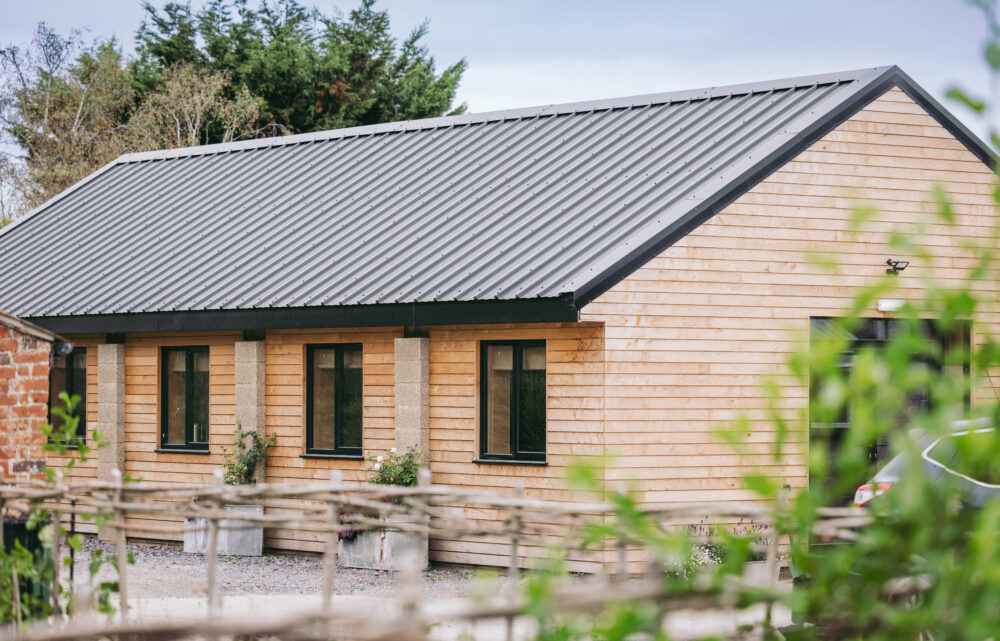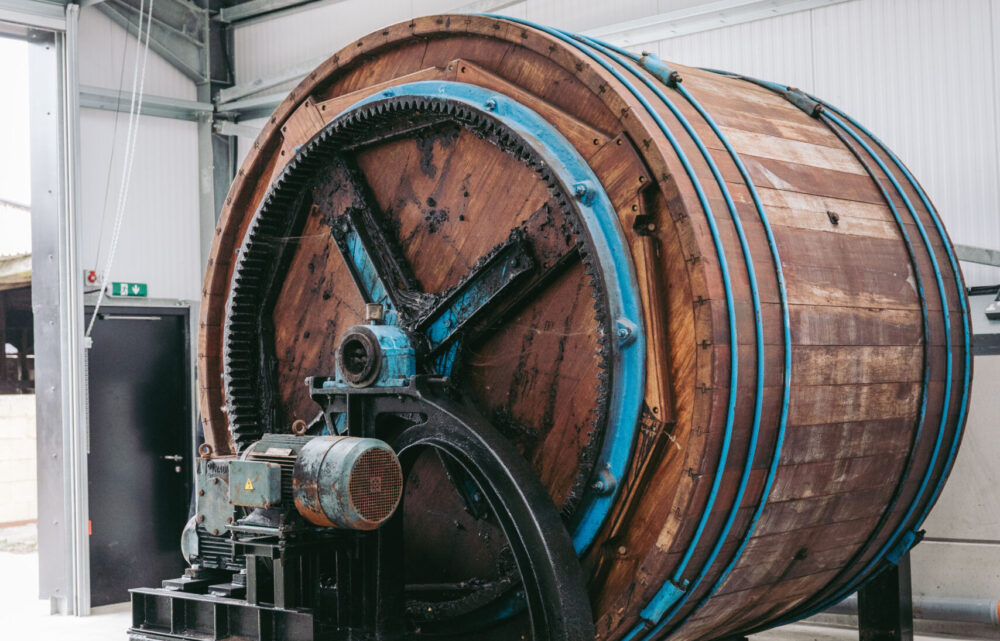Katie and James brought Great Cotmarsh Farm in 2022, having previously spent 15 years farming in the Cotswolds. I first went to see them towards the end of 2023, a dynamic pair of farmers who had some very big ideas. The farm is in North Wiltshire, on the edge of the North Wessex Downs, where they have recently converted to organic and are Pasture for Life certified.
Conservation and nature are placed at the forefront of their minds in everything they do in their farming system, and I found it hard not to be completely swept away with their enthusiasm for all things farming. As we walked around the farm amongst their native breed British White cattle, they told me about their multiple visions to boost the UK textile industry, creating an organic dye garden, sustainable fashion education centre and a Micro-tannery.
Occasionally as a FiPL officer, you meet very enthusiastic people who have big ideas, however not all of them have the dedication and qualifications that Katie and James have. James has an impressive tanning CV; he gained a Churchill fellowship to spend time as an intern at a US micro tannery, he also attended world leather conferences and visited German and Italian tanneries. He has also obtained funding for a tannery expert mentor associated with Cranfield University for the next three years.
But over six months went by since I visited, and I had heard no more about their plans or any sign of an application, or if they even were going to apply. Then walking around Groundswell I came across the Pasture for Life tent. North Wessex Downs, the Chilterns and Cotswolds FiPL have jointly funded an ambitious project ‘Pasture and Profit in Protected Landscapes’. I knew that Katie was signed up as a mentor to help support other farmers in the landscape transition to a more regenerative, pasture fed system, but I wasn’t expecting to find her at the back of the tent, with a showcase of her home grown woollen fashion items. She told me she was also speaking to other farmers at Groundswell about sustainable local fashion and how others could use a similar model. I asked her again about the initial FiPL ideas and she assured me the dream was still there and she would be back in touch.
After a long wait Katie and James eventually emailed to ask for some FiPL support in developing an application. They had two project ideas, the first was to create the first micro-scale organic vegetable tannery for cow hides, set up as a community interest company, to teach the local community / businesses and farmers how to tan and use their own hides. The second application was for an education hub, to help a wide cross section of the public, teaching students from primary school age through to adults about farming, design, sustainable fashion and craft – with regenerative farming principles at its heart.
There are only two commercial tanneries left in the UK that work with cattle hides and use the traditional method of vegetable tanning. The Heritage Craft Association has oak bark tanned leather on its red list of critically endangered crafts. In 2023 the last leather education facility in the UK, the Institute of Creative Leather Technology (ICLT) at Northampton University also closed.
In September 2024 the Local Assessment Panel members were presented with the applications, the tannery at 80% and the education centre at 60% intervention rates. Micro-tanneries are not large scale profit making enterprises and the tannery has been set up as a Community Interest Company, focusing on teaching people this heritage craft, but also to enable and help set up other micro-tanneries across the UK. Katie and James submitted 13 letters of support for their application, with each letter setting out how the projects would enhance and compliment their business. Andy Rummings a local farmer who runs leather workshops said: “The proposed project will deliver exactly what my business needs. The benefits will ripple out across the local area and I think it will become a hub for farmers diversifying into fibre / leather enterprises”
As the North Wessex Downs’ largest ever application, it was expected it would face rigorous scrutiny. The panel discussed the importance of rural heritage crafts, the declining leather industry and the impacts of UK hides going to landfill. They all acknowledged the educational benefit for the wide audiences that the education centre and tannery would give. The letters of support gave the panel additional confidence. Intervention rates were discussed and considered at length by all the Panel and they decided that they were appropriate relative to risk, potential profit and benefit to the local landscape. It was a unanimous decision to award funding of £253,000 for the two projects.
The grant was awarded in September 2024 and building work has already started. It is a large project to turn around before the end of March and the FiPL team have regular meetings and progress checks with Katie and James. The building work is set for completion at the end of February, with hopefully a grand opening of the facilities at some point in the Summer of 2025. Talking about the FiPL process, Katie and James said “As with any grant application there are forms to fill in, however we actually found completing them helped us to really focus on what our project objectives were – and had the potential to be. Our FiPL officer has been amazing, so supportive and always there to help with the process. We are incredibly grateful that schemes like this exist.”
The North Wessex Downs team expect to work with Katie and James for the foreseeable future and to monitor the number of people and schools benefitting from the project. It is exciting for everyone to think that this could be the start for other farmers to diversify their businesses and use this model to set up their own micro tanneries and create sustainable markets for their otherwise nearly worthless hides and wool.
To find out more about the micro tannery or education hub and follow the work Katie and James are doing please visit their website: www.greatcotmarshfarm.co.uk for links to follow them on LinkedIn, Facebook or Instagram.
To find out more about other FiPL projects in the North Wessex Downs please visit: Projects funded by FIPL – North Wessex Downs National Landscape
By Jemima Sellwood FiPL officer for the North Wessex Downs National Landscape
Photo: James Allen, Great Cotmarsh Farm



